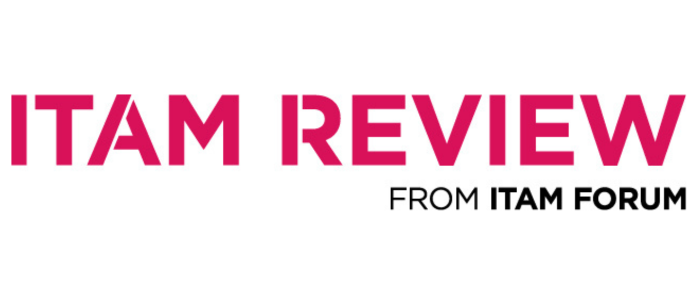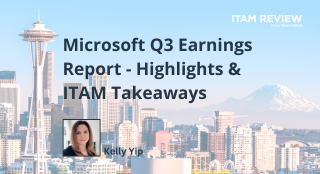Oracle vs. Government of Chile: Oracle's sloppy licensing exposed
Oracle Corporation have long been famous for their database software, and their often tricky, sometimes flummoxing, usually expensive, licensing rules – and the audits that go with them.
IT Asset Managers worldwide have struggled, often through no fault of their own, to understand and keep up to date with Oracle’s database licensing rules and organisations across the globe have felt the financial sting of falling short during an audit with the Redwood, California based software behemoth.
Well, it seems things might be changing – just a tiny amount.
What’s happening?
La Fiscalía Nacional Económica (FNE), the National Economic Prosecutor of Chile, has been investigating the business practices of Oracle de Chile s.a, with regards to Oracle Database, and particularly:
- Matching Service Levels
- Reinstatement Fees
- Audit Practices
Their aim has been to understand where Oracle may be abusing their position and to find what, if any, changes must be made to help Oracle’s customers.
Matching Service Levels
What is this?
When acquiring technical support, all licenses in any given license set must be supported under the same technical support service level. You may not support a subset of licenses within a product family (license set); “the license set must be reduced by terminating any unsupported licenses” i.e. the organisation must give up ownership of any licenses that will not be covered with support.
What is a license set?
Oracle define a license set as:
- All the licenses for a specific program – i.e. all Oracle Database Standard licenses
- All the licenses that share a code base – i.e. all Oracle Database Enterprise Edition licenses, plus Database Enterprise Edition Options and Database Enterprise Management Packs
Why?
Oracle state this is required to prevent customers maintaining support on just one license of a larger set and using that support access to update and maintain all their licenses – rather than just the one covered with support.
Reinstatement Fees
What is this?
If technical support lapses or was not originally purchased with a program license, a reinstatement fee must be paid if support is now required. This fee is 150% of the total amount of support that would have been paid from the original purchase/support lapse.
It is important to realise that these fees are in addition to being required to pay the technical support fee for the period in question.
If lapsed
The 12-month support cost will be taken as the last annual support fee you paid for the product in question.
If never acquired
The 12-month support cost will be taken as the fee that would have been charged if support had been ordered, per the current pricing policies.
Audits
Automatic installation of packs and options
The FNE found that “frequently, audits involved the wrong or automatic installation of products/optional packs where customers didn’t know they required separate licenses”.
These products – such as the Tuning Pack, Partitioning, and Diagnostics Pack – are options that must be licensed separately, and incur additional charges, but are installed automatically when using the default installation option presented by the software. This means, to be sure of a compliant installation, organisations much choose the “Customized” installation option and select only the options included within the license. It seems reasonable to believe that many people would do the opposite – that is stay away from the “Customized” option, lest they inadvertently select an option for which their organisation is not licensed.
During their investigation, the FNE found 64% of the cases involved optional packs that were installed automatically.
Additionally, Oracle make all versions, options, packs etc. available for download – without the need for additional keys and with no warnings that additional licensing will be required. This too leads to inadvertent under-licensing, with many people working on the assumption “if we hadn’t bought it, we wouldn’t be able to access it”.
It is general practice from Oracle to charge only for packs and options that have been used but, once these have been inadvertently installed, it can be extremely easy for them to be used – even without realising it.
Audit Process
LMS (License Management Services) perform the audit and deliver a “technical” report to the customer, giving them 30 days to resolve the problems – but no defined path of recourse. There is no obvious procedure to follow to clarify or refute any claims made within the report.
Next, the sales team step in to get the shortfall made up. It has been verified by the FNE that Oracle’s initial claim can be “considerably reduced” during negotiations around the amount due. Several customers reported Oracle Cloud solutions, that they did not require, being included in these shortfall settlements. Others also reported a lack of clarity around the potential for future legal actions from Oracle.
The clients spoken to by the FNE all stated repeatedly that “there would appear contractual conditions that they did not know” and this is where the under-licensing risks lay.
Too Much Information
The FNE contend that a big part of the problem is the “asymmetry of information that exists between Oracle and its customers”
The FNE visited www.oracle.com/us/corporate/contracts/index.html which holds information on the various Oracle contracts and found that when you click on the contract information links, there are then multiple links presented – making it a less than straightforward process.
The License and Service Agreement (OLSA) link led to 15 further links and the Oracle Master Agreement (OMA) link led to 10. Many of those links branched out into further links, making it very difficult for organisations to a) be sure they’ve seen all the relevant information and b) have the time to discover, read and process all the information.
Website redesign
Oracle appear to have recently revamped these areas of their website. The primary link is now https://www.oracle.com/corporate/contracts/index.html which leads here:
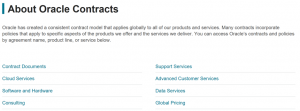
Following the “Contract Documents” link takes you to a page with 6 different options:
- Oracle Master Agreement (OMA)
- Oracle Cloud Services Agreement
- Oracle License and Services Agreement (OLSA)
- License Definitions and Rules
- Oracle Services Agreements
- Oracle Data Agreement
The OMA page contains almost 20 links – although just 7 are generally relevant.
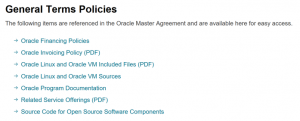
The OLSA page contains 15, although only 4 of these are related to policies (the others being hardware amendments).
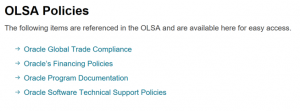
However, clicking “Program Documentation” leads to the “Help Center” where you are presented with 15 different product types and each of those leads to more links.
Another example of this information overload is the “Database Concepts” webpage -(https://docs.oracle.com/database/121/CNCPT/title.htm) – which the FNE say runs to 660 pages all together.
Changing conditions
Oracle often change licensing conditions and rules as new products are introduced. Although the vendor says that customer consent is always required where a change may be detrimental to the end user organisation, that is only at the time of the change. Once the new rules are within the license agreement, customers must accept them at renewal. Many clients with whom the Chilean FNE spoke reported that they were only informed of many changes via a website, rather than being told directly.
Equally, Oracle’s “aggressive business practices” push organisations to sign contracts in a short time frame – often not allowing time for all the changes and modifications to be a) noticed and b) understood.
Abuse of a dominant position?
To decide whether Oracle were abusing a dominant position, the FNE first had to decide if Oracle HAD a dominant position.
They found that Oracle does hold a dominant position and has done since at least 2012, but the current evolution of the market shows that Oracle’s share may well decrease. They conclude that there are other actors that compete “in an important way” in the licensing sector – particularly SAP – and point to the fact that the emergence of Cloud technology could further weaken Oracle’s position. They also state that, in relation to support and maintenance “there are no interested actors to enter the national market”.
Intellectual Property and competition rights
The FNE point out the European Commission has already stated:
“The fact that intellectual property laws grant exclusive rights of exploitation does not imply that intellectual property rights are immune from competition law intervention”
To show there is no claim that they shouldn’t be investigating Oracle in this way.
Outcome
As a result of this investigation, Oracle have offered to adopt a range of measures to help reduce this imbalance of information.
These measures include:
- Improving the information about packs and options
- A notice on the product download page
- Communicating to customers that additional options may require separate licensing
- Improved information in the opening and closing audit letters
- Increased visibility of tools to verify compliance
- Creation of a contact for disputes
- Local training for the LMS (License Management Services) team
Matching Service Levels
No action has been recommended for Oracle to take.
Findings
The FNE find that, although this is a severe measure to protect Oracle’s IP, it is something that customers agree to when signing contracts. Additionally, Oracle Chile put forward that exceptions to this rule can be granted, when it can be proven the support will not be used for unsupported licenses. This is typically allowed where an organisation has multiple global divisions and one will have licenses with support and another without. There tend to be minimum size and spend requirements for Oracle to consider offering this concession.
Reinstatement Fees
Findings
The FNE find that this reinstatement fee makes sense as a payment to cover the improvements made to Oracle programs during the unsupported period; but they agree with the policy only up to – at most- 100% of the cost. They find that the additional 50% charged could serve to discourage organisations from working with 3rd party support companies (such as Rimini Street) because, should they wish to return to Oracle, they will have to pay the additional charge.
However, the FNE then go on to state that “there are no companies wishing to access the market for maintenance services and/or support to Oracle customers in the short term”, meaning there are no Oracle competitors to be affected and so no actions were recommended to be taken.
This is an interesting viewpoint as Rimini Street, the 3rd party Oracle support vendor, have a Latin America HQ (in Sao Paulo, Brazil) – headed up by Edenize Maron, GM for Latin America. Furthermore, this 2016 press release indicates that Rimini Street have clients in Chile already – https://www.riministreet.com/press-releases/04112016.
If the FNE judge the 3rd party support situation to change within Chile, I would imagine this will be the first element to be reviewed. It perhaps also sets up the case that, in regions where 3rd party support is more prevalent, re-instatement fees should be investigated.
Audits
Packs and Options
Oracle will add a notice on the download site https://edelivery.oracle.com warning customers that certain packs and options are included with the download but will incur additional costs if enabled/used. This notice should become visible to Chilean customers within the next few months.
They will also send a letter to all current customers and, for at least 2 years after the resolution of this case, a letter/email to new customers detailing this information too.
Audit letters
The closing letter given to customers will be improved, with an added paragraph detailing:
- If products are compliant
- If not, how the non-compliance can be rectified by purchasing “relevant or necessary” products
- Other ways of resolving the non-compliance
The opening audit letter will also tell organisations that this information will be included at the end of the audit.
Increased tool visibility
Oracle will increase the visibility of compliance tools across two websites:
https://www.oracle.com/us/corporate/license-management-services/index.html
https://www.oracle.com/corporate/license-management-services/resources.html#vendortools
It will also increase visibility of the license compliance tools included within Oracle DB Enterprise edition, whilst making sure to mention the use of these can involve additional costs.
Disputes
Oracle will create a contact where customers can raise disputes and complaints related to the audit process. This contact will be Chilean only.
Investigation outcome
When it came to Matching Support and Reinstatement Fees, the FNE found that “there were plausible arguments that allow, for the moment, to rule out Oracle abusing a dominant market position.
With regards to audits, it was found that the main cause of organisations being under licensed was the installation of additional, unlicensed products – either through automatic means or through the customers being poorly informed – and the “asymmetry of information” causing customers to be unaware of policies and clauses. The aforementioned measures seem to be enough to prevent the FNE taking any further action against Oracle Chile – at least for the time being.
Conclusion
It’s good to see regulatory bodies taking the time to investigate the practices of large software vendors.
While it is positive to see Oracle making these changes, one could argue this is simply them doing what should have been done from the start – telling customers that they’re unknowingly installing things that they will be charged for in the future and giving them a route by which to raise complaints. It’s important to note that Oracle haven’t said they will stop the practice of bundling the options with the default installer, which would seem a more truly encouraging act.
Global issues
However, clearly these issues are in no way specific to Chile; customers fall foul of these problems across the globe. If Oracle can admit these measures need to be introduced in Chile, why limit it to one country?
Are they saying the businesses of Chile are peculiarly prone to these licensing mis-steps, or are they saying that – while they acknowledge these practices lead to customers paying more than they really should – they will allow them to continue in other countries until each relevant authority takes the time and effort to launch an investigation?
What’s next?
These changes in Chile set a precedent, and Oracle should now be pressed to implement them worldwide – as standard. There is no reason any country should be exempt and all organisations (perhaps except Oracle) would stand to benefit from these changes.
Further Reading
Can’t find what you’re looking for?
More from ITAM News & Analysis
-
Broadcom vs Siemens AG - A Brewing Storm
The ongoing legal battle between VMware (under Broadcom ownership) and Siemens is yet another example of why ITAM goes far beyond license compliance and SAM. What might, at first glance, appear to be a licensing dispute, ... -
Shifting Left Together: Embedding ITAM into FinOps Culture
During one of the keynotes at the FinOps X conference in San Diego, JR Storment, Executive Director of the FinOps Foundation, interviewed a senior executive from Salesforce. They discussed the idea of combining the roles of ... -
Addressing the SaaS Data Gap in FinOps FOCUS 2.1
I recently reported on the FinOps Foundation’s inclusion of SaaS and Datacenter in its expanded Cloud+ scope. At that time, I highlighted concerns about getting the myriad SaaS companies to supply FOCUS-compliant billing data. A couple ...
Podcast
ITAM training
Similar Posts
-
Broadcom vs Siemens AG - A Brewing Storm
The ongoing legal battle between VMware (under Broadcom ownership) and Siemens is yet another example of why ITAM goes far beyond license compliance and SAM. What might, at first glance, appear to be a licensing dispute, ... -
Microsoft Power Apps: Current Pricing Models Comparison
Back in November 2021, Microsoft made Power Apps available under the pay-as-you-go (PAYG) model, alongside the traditional Per User/Per App options. This PAYG model has gained popularity. It ensures simple rightsizing for Power Apps environments. Here, ... -
Microsoft Q3 Soars as AI and Azure Growth Fuels Market Gains
On the 30th April, Microsoft released its Q3 quarterly earnings report, exceeding expectations and igniting investor optimism. Investors had been keeping a watchful eye on Azure’s Cloud performance after Microsoft’s Q2 Cloud results fell short of ... -
The High Cost of Oracle Java: Managing Expenses and Operational Efficiency
For businesses reliant on Java, Oracle’s licensing model presents a formidable challenge. Once a freely available technology, Java has evolved into a costly necessity for enterprises, with licensing changes leading to widespread financial and operational concerns. ...
